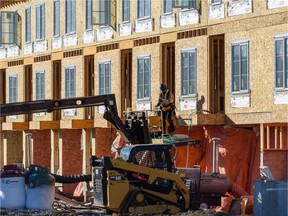Even as migration and a youthful population stoke interest in buying a home in Alberta, many are watching interest rates carefully.

Reviews and recommendations are unbiased and products are independently selected. Postmedia may earn an affiliate commission from purchases made through links on this page.
Article content
Calgarians are potentially eager beavers when it comes to homebuying, a new survey suggests. The report by online realty firm Wahi looked at buyer intentions across Canadian provinces, finding one in four Albertan respondents are considering buying a home in 2024.
That’s compared with the national average of about 18 per cent.
Article content
“We think it’s a combination of several factors at play in the province,” says Benjy Katchen, chief executive officer at Wahi, which commissioned the survey by Angus Reid.
Advertisement 2
Article content
He notes that Alberta has a younger population than other provinces, and the survey found younger Canadians are more likely to buy a home, with 24 per cent noting they were considering doing so this year.
The other driver for Alberta markets, notably Calgary’s, has been high migration with many Canadians from other provinces moving here, Katchen adds. The most recent data from the Alberta government shows a surge in net migration from July 2022 to July 2023. During that span the province saw net migration of more 56,000 people, nearly double the previous record set in 2014.
Calgary realtor Richard Fleming is not surprised more people — locals or migrants — are looking to get into Calgary’s housing market “now that interest rates have come down in recent months.”
The real estate agent with Re/Max Mountain View notes that five-year fixed-term mortgages have dipped below five per cent, down from more than six per cent about three months ago.
“That’s prompted more people to get into the market, and as rates drop some more, that (increase in activity) will continue to happen at likely an even greater pace.”
Article content
Advertisement 3
Article content
Fleming further notes the market likely has a lot of pent-up demand. Many people have been waiting to get into the market since interest rates started rising in March 2022, he explains.
Many were forced to wait, unable to qualify for a mortgage especially as prices continued to rise as Calgary remained a hot market driven by a resurrected economy and high inter-provincial migration. As an RBC Economics report noted earlier this year, Calgary saw a nearly 11 per cent average price increase year over year in 2023 — the highest among Canada’s largest cities. Sales were also up nearly 11 per cent, trailing only Edmonton where sales grew nearly 25 per cent year over year.
“This is a complete reversal from a few years ago pre-pandemic when market conditions were not good,” Fleming notes.
Even the long-suffering condominium market is having its day in the sun with resales for the segment growing 54 per cent in January, year over year, the highest percentage expansion among all housing segments, Calgary Real Estate Board statistics show.
“Finally, people are starting to break even or make money if they sell,” Fleming says, noting owners who bought a condominium a decade or more ago have been waiting for prices to recover.
Advertisement 4
Article content
That is more of a likelihood today with the benchmark in January reaching $324,000, up 19 per cent year over year. That is well above the 2014 record price of about $300,000, which was only surpassed last year.
One driver for apartment demand has been first-time buyers, given condominiums remain most affordable by price range, he says.
Another has been investors — including out-of-province buyers from large cities where condominium prices on average are double Calgary’s benchmark price, he says. “Low vacancy is making renting an attractive play.”
Recent Canada Mortgage and Housing Corp. statistics show vacancy last year in Calgary’s secondary rental market — investors renting condominiums — was one per cent, and the purpose-built apartment rental market was about 1.4 per cent.
Despite Albertans being more bullish than other Canadians about buying, 51 per cent of respondents were waiting to see what interest rates do compared with 48 per cent nationally, the Wahi survey found.
“So there is still a lot of uncertainty,” Katchen says.
Article content



